Описание книги
About the product The simulators are prepared by practicing neuropsychologists who every day help to cope with the learning problems that arise in children in elementary school. The use of manuals in the educational process or as additional material will allow the child to study successfully, in a timely manner eliminating all sorts of difficulties and difficulties with the development of school material and the formation of the necessary skills. Non-standard game tasks offered by the specialists of the Center for Child Neuropsychology. A.R. Luria, will help develop the child’s abilities and cope with the difficulties that arise in the learning process, as well as become an excellent prevention of possible problems. Annotation The main task of the manual is to teach schoolchildren to write beautifully and improve their handwriting. The book is based on a neuropsychological approach: simultaneously with the task of mastering Russian graphics, exercises are provided for the development of fine motor skills, attention, visual image of letters and words. The manual is divided into three parts. The first part improves the skill of writing capital letters. The second part encourages you to practice writing those lowercase letters that are based on hooks and sticks. The third part focuses on lowercase letters consisting of circles and loops. The order of the tasks is extremely important, since before starting to automate the writing skill of each group of letters, it is proposed to activate motor functions, recreate the visual image of similar letters, focusing on their differences, then write the graphic elements of each sign and catch the peculiarities of the connection of this letter with others. In addition, copybooks also include single words and coherent texts that can be traced around to achieve calligraphic excellence. The final task for each group in the second and third parts is repeated — this will give an opportunity to see how from page to page the handwriting is getting better and better. Addressed to younger students, parents. …
FAQ
